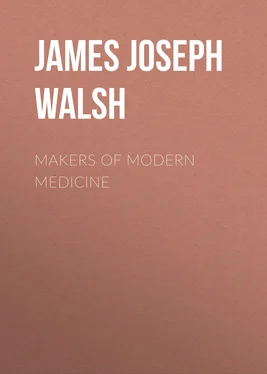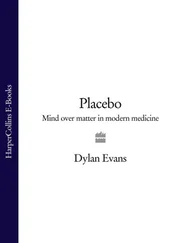James Walsh - Makers of Modern Medicine
Здесь есть возможность читать онлайн «James Walsh - Makers of Modern Medicine» — ознакомительный отрывок электронной книги совершенно бесплатно, а после прочтения отрывка купить полную версию. В некоторых случаях можно слушать аудио, скачать через торрент в формате fb2 и присутствует краткое содержание. Жанр: foreign_prose, Медицина, foreign_antique, на английском языке. Описание произведения, (предисловие) а так же отзывы посетителей доступны на портале библиотеки ЛибКат.
- Название:Makers of Modern Medicine
- Автор:
- Жанр:
- Год:неизвестен
- ISBN:нет данных
- Рейтинг книги:3 / 5. Голосов: 1
-
Избранное:Добавить в избранное
- Отзывы:
-
Ваша оценка:
- 60
- 1
- 2
- 3
- 4
- 5
Makers of Modern Medicine: краткое содержание, описание и аннотация
Предлагаем к чтению аннотацию, описание, краткое содержание или предисловие (зависит от того, что написал сам автор книги «Makers of Modern Medicine»). Если вы не нашли необходимую информацию о книге — напишите в комментариях, мы постараемся отыскать её.
Makers of Modern Medicine — читать онлайн ознакомительный отрывок
Ниже представлен текст книги, разбитый по страницам. Система сохранения места последней прочитанной страницы, позволяет с удобством читать онлайн бесплатно книгу «Makers of Modern Medicine», без необходимости каждый раз заново искать на чём Вы остановились. Поставьте закладку, и сможете в любой момент перейти на страницу, на которой закончили чтение.
Интервал:
Закладка:
While this is readily acknowledged by every generation, with regard to the past, it is curious to note how different is the appreciation of each generation for the theorist as opposed to the observer. Medical theorists have always been honored by their contemporaries unless their theories were utterly outlandish, and even then they have had many disciples, and have seldom been without honor and never, with sorrow for the foolishness of men be it said, without emolument. The observer, however, has but rarely been in favor with his contemporaries. Not infrequently the observation that he made appeared to be so obvious that his fellows could not think that it represented a great truth. As a consequence they have usually derided him for attempting to make them see a significance in his observation that they could not think was there. Huxley once stated the phases through which a new scientific truth ordinarily passes. At first it is said to be trivial and insignificant, then as it attracts more attention it is declared to be in contradiction with hitherto known truth. Finally it is declared to be after all only in other terms what the world has always believed in the matter. Certainly through these stages all the great discoveries in medicine have gone. So true is this, that if what seems to be a new truth in medicine is accepted at once, and willingly, there is more than a suspicion that it is not really a new discovery but only a modification of something hitherto well known.
All the great discoverers in medicine have practically without exception met, if not with opposition, surely with neglect of their work. We smile complacently now at the generation that considered the stethoscope a toy, and asked derisively if they should be expected to carry it about with them. The next generation, however, having grown accustomed to the stethoscope, refused quite as inconsequentially to have anything to do with the thermometer. They refused to carry these glass things around with them in order to test the fever that patients might have, since they claimed they were able to accomplish this purpose quite as well by means of their educated touch. The generation of medical men is not yet passed who refused to credit the thought that the diagnosis of diphtheria would ever be made only by the microscope and culture methods, and who considered that they could tell very well what was diphtheria, and what not, from the appearance of the throat.
Of course similar opposition was the fate meted out to every distinguished scientific discoverer, and so I suppose medical men cannot complain. His contemporaries said of Galvani that he had made of himself a dancing master for frogs, because he continued his observations on the legs of these animals in order to solve the problems of animal electricity. Pasteur's demonstration that there was no such thing as spontaneous generation, served at first only to bring down on his devoted head the aspersions of most of the distinguished scientific men in Europe. When that genius, the physician Robert Mayer, discovered the conservation of energy as the result of his acute observation, that blood drawn by venesection in the tropics was redder than that drawn in colder climates, he found that scientific circles were not only not ready to accept his demonstration, but that he was looked upon as a visionary, somewhat as one who thought that he had solved the problem of squaring the circle or the endless puzzle of perpetual motion.
Fortunately these men have as a rule had a physical and mental force that enabled them to go on in spite of the opposition or derision of their contemporaries. It is rather a curious fact that most of the great medical discoverers were born in the country and were as a rule the sons of rather poor parents. Many of them were so situated that they had to begin to make their own livelihood to some extent at least at the beginning of their third decade of life. Far from proving a hindrance to their original work, this necessity seems rather to have been one of the sources of inspiration that spurred them on to successful efforts in their investigations.
Most of them were what would be called handy men, in the sense that they could use their hands to work out their ideas mechanically. This was typically true of Galvani, who had to construct his own first electrical instruments, and of Laennec, who took pride in making his own stethoscopes. So many of them made by his own hands are still extant, that a number of museums have the opportunity to hold specimens of his handiwork. Auenbrugger and Johann Müller and Pasteur are further examples of this same handiness. Claude Bernard exhibited this quality very early in life and continued to exercise it all during his career.
Nor was their ingenuity limited to material things. Many of them were interested in literary and artistic work of various kinds. Morgagni was considered a literary light in his generation. Auenbrugger composed a musical comedy which had a distinct success, even in music loving Vienna. The Empress Maria Theresa said that she supposed he would now continue to write musical comedies; but Auenbrugger replied, with more candor than gallantry, that he had something better to do. Claude Bernard composed a play that shows distinct evidence of literary talent. It seems fortunate indeed that he was diverted from his original intention of following literature as a career, and took up medicine. Many of the others, as, for instance, Graves and Stokes, were excellent judges of art, critics of real knowledge and genuine appreciation; and indeed it may be said that none of them was ever so absorbed in his vocation of medicine as not to have much more than a passing interest in some of the great phases of intellectual activity quite apart from his professional work, or from scientific knowledge: an avocation to which he turned for the only true recreation of mind there is–a change of work.
This seems all the more worth while calling attention to in our strenuous age, because it is sometimes considered a mistake for a physician to show that he is interested in intellectual pursuits of any kind apart from his professional work. It is supposed that no one is capable of dividing his attention in this way and yet do justice to his profession and his patients. As a matter of fact it has well been said that no really great physician has ever been a narrow specialist in the sense that he knew only medicine well; there was always at least one other department of intellectual attainment with which he had made himself so familiar as to be an authority in it. It is not the lopsided who make great athletes, and it is not the one-sided man who succeeds in doing really great work. Practically all the great physicians have had favorite hobbies to which they have turned for relaxation, for surely no one understands better than physicians that recreation consists not in that impossibility, the doing of nothing, but in resting the mind by doing something quite different from what it has been engaged at before.
There is another phase of the lives of these great men of medicine that is so different from what is ordinarily thought to be the rule with physicians, that it seems worth while emphasizing at the end of this introduction. All these great discoverers have been men of constructive imagination, men who might have been distinguished litterateurs very probably, had they applied themselves in that field. All of them have had too much imagination to be materialists, that is, to consider that they could know nothing except what they learned from the matter with which their studies were taken up. All these great discoverers in medicine have been simple, sincere, faithful believers, ready to express their trust in an overruling Providence, and in a hereafter that they knew only by faith, it is true, but which was for that reason none the less distinctly recognized. While it is usually considered that medicine leads men's minds away from orthodox thinking in the great matter of the relationship of the creature to the Creator, all these men have been not only ready to acknowledge their personal obligations to Him, but have furnished exemplary models of what the recognition of such obligations can make of human lives.
Читать дальшеИнтервал:
Закладка:
Похожие книги на «Makers of Modern Medicine»
Представляем Вашему вниманию похожие книги на «Makers of Modern Medicine» списком для выбора. Мы отобрали схожую по названию и смыслу литературу в надежде предоставить читателям больше вариантов отыскать новые, интересные, ещё непрочитанные произведения.
Обсуждение, отзывы о книге «Makers of Modern Medicine» и просто собственные мнения читателей. Оставьте ваши комментарии, напишите, что Вы думаете о произведении, его смысле или главных героях. Укажите что конкретно понравилось, а что нет, и почему Вы так считаете.












